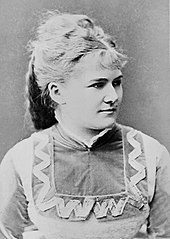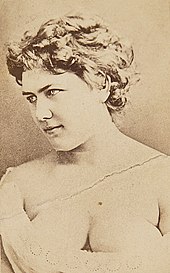Hermione Meyerhoff
Hermine Meyerhoff , by marriage to Hermine von Tatitscheff (born March 26, 1848 in Braunschweig , † February 24, 1926 in Waltendorf , now part of Graz ), was a German - Austrian opera and operetta singer ( soprano ).
Life
Hermine Meyerhoff was born as the daughter of a municipal fountain master . Her acting talent was discovered at a young age. After a short vocal training in Braunschweig, she made her debut at the court theater there in 1868 as Ännchen in Carl Maria von Weber's opera Der Freischütz . This was followed by short stages at the Stadttheater in Danzig and at the Floratheater in Hamburg , where she appeared in soubrette roles. Afterwards she turned to the operetta subject and was in Vienna initially as an operetta singer at the Carltheater, later engaged at the Theater an der Wien . As a result, she took part in several Viennese premieres . In 1876 she was seen in the Carltheater with a leading role in Fatinitza by Franz von Suppè and in 1878 in the Theater an der Wien in Blindekuh by the younger Johann Strauss as Betsy . In the last-mentioned performance she played a leading role alongside Alexander Girardi , Bertha Olma and Felix Schweighofer . In 1880 she also played and sang Donna Irene in the world premiere of the operetta The Queen 's Lace .
From 1881 she gave guest performances at stages in Berlin , Dresden , Florence , St. Petersburg and Moscow, among others . After marrying a Russian nobleman, she ended her career as a celebrated singer in 1886.
- Meyerhoff affair
In 1870, according to contemporary moral concepts, "revealing" photographs with cleavage by Hermine Meyerhoff were the subject of a court case before the Vienna Regional Court, the so-called "Meyerhoff Affair", which was widely noticed by the public at the time. The disputed photographs had been sold without authorization by an employee of the photo studio to the art dealer Samuel Sonnenthal, who reproduced the pictures, exhibited the corresponding copies in the window of his shop and resold them. Hermine Meyerhoff demanded the publication of the relevant photos in the process. The trial against Samuel Sonnenthal ended with the sentencing to a fine of 100 Austrian guilders and the obligation to hand over the still existing photographs and the negative (matrix) to Hermine Meyerhoff. In connection with the illegally sold photographs, a caricature by Hermine Meyerhoff also appeared in the satirical magazine Der Floh in December 1869 . The criminal process initiated by Hermine Meyerhoff for insulting the responsible editor Karl Floh ended in March 1870 with his sentencing to one month's arrest.
literature
- Karl-Josef Kutsch , Leo Riemens : Large Singer Lexicon , Volume 4 . 4th edition. Walter de Gruyter, Berlin 2004, ISBN 978-3-598-44088-5 , p. 3103 . (accessed via De Gruyter Online)
- Wilhelm Kosch , Ingrid Bigler-Marschall (Ed.): German Theater Lexicon . Volume IV: Singer - Tzschoppe. De Gruyter, Berlin [et al.] 1998, p. 2507. ISBN 978-3-907820-28-5 (accessed via De Gruyter Online).
- Ludwig Eisenberg : Large biographical lexicon of the German stage in the XIX. Century . Verlag von Paul List , Leipzig 1903, pp. 673–674, ( Textarchiv - Internet Archive ).
- From legal life p. 81. In: Wiener Zeitung No. 78. April 6, 1870, accessed on February 8, 2021 .
Web links
- Hermine Meyerhoff at Operissimo on the basis of the Great Singer Lexicon
Individual evidence
- ↑ Kevin Clarke : World Premiere Recording of Strauss' “Blindekuh” (1878). In: operetta-research-center.org. March 31, 2020, accessed January 15, 2021 .
- ↑ Michael Martischnig: Sonnenthal, Samuel. In: Austrian Biographical Lexicon 1815–1950 (ÖBL). Volume 12, Verlag der Österreichischen Akademie der Wissenschaften, Vienna 2005, ISBN 3-7001-3580-7 , p. 424 f. (Direct links to p. 424 , p. 425 ). (pdf; 59 kB).
- ↑ a b From legal life. In: Wiener Zeitung . No. 78, April 6, 1870, p. 81 , accessed on December 30, 2020 (reproduced on ANNO ).
- ↑ a b c Andrea Reisner: Gentlemen's jokes and sharp criticism. In: Wiener Zeitung Online . November 13, 2020, accessed December 30, 2020 .
- ↑ Miss Meyerhoff. In: The Flea . No. 51, December 19, 1869, accessed January 8, 2021 (reproduced on ANNO).
- ↑ From the courtroom. In: New Free Press . No. 1982, March 6, 1870, accessed January 8, 2021 (reproduced on ANNO).
- ^ "Floh" - Meyerhoff (process protocol). In: The Flea. No. 10, supplement, March 6, 1870, accessed on January 8, 2021 (reproduced on ANNO).
| personal data | |
|---|---|
| SURNAME | Meyerhoff, Hermione |
| ALTERNATIVE NAMES | Tatitscheff, Hermine von (married) |
| SHORT DESCRIPTION | German-Austrian opera and operetta singer (soprano) |
| DATE OF BIRTH | March 26, 1848 |
| PLACE OF BIRTH | Braunschweig |
| DATE OF DEATH | February 24, 1926 |
| Place of death | Waltendorf , now part of Graz |

